高一高二高三收藏——2021高考英语复习之重点词汇短语练习八
作者:未知 时间:2020-12-02 阅读:( )
2019年全国卷I阅读理解D篇重点单词、语块
1. rosy [ˈrəʊzi] adj. 美好的
2. elementary [ˌelɪˈmentri] adj. 初级的;基础的
3. openness [ˈəʊpənnəs] n. 诚实;率真;坦率
4. carry over 继续存在,保持下去
5. analyze [ˈænəlaɪz] vt. 分析
6. conclusion [kənˈklu:ʒn] n. 结论
7. come to another conclusion 得出另一个结论
8. be related to positive life outcomes 与积极的生活结果有关
9. be responsible for 作为……的原因;成为……的起因
10. create opportunities for 创造……的机会
11. gain an advantage 获得优势
12. during the rosy years of elementary school 在美好的小学时光
13. doll [dɒl] n. 玩偶;玩具娃娃
14. status [ˈsteɪtəs] n. 地位;身份
15. tween [twi:n] n. 10至12岁之间的少年
16. teen [[ti:n] n. 13岁到19岁的青少年
17. mean girls 刻薄的女孩
18. rank [ræŋk] n. 地位,级别
19. smoke cigarettes 抽烟
20. break rules 违反制度
21. play jokes on sb. 捉弄某人
22. popularity [ˌpɒpjuˈlærəti] n. 受欢迎
23. a well-explored subject 一个被人们广泛研究的课题
24. clinical [ˈklɪnɪkl] adj. 临床的
25. a professor of clinical psychology 临床心理学教授
26. category [ˈkætəgəri] n. 类别,种类
27. sort the popular into two categories 将受欢迎的人分为两类
28. lik(e)able [ˈlaɪkəbl] adj. 讨人喜欢的
29. seeker [ˈsi:kə(r)] n. 寻找者;追求者
30. quality [ˈkwɒləti] n. 品质
31. strengthen [ˈstreŋθn] vt. 加强;增强;巩固
32. schoolyard [ˈsku:ljɑ:d] n. 校园
33. jump-start [ˈdʒʌmpstɑːrt] vt. 推动;刺激
34. interpersonal [ˌɪntəˈpɜ:sənl] adj. 人际关系的
35. jump-start interpersonal skills 提高人际交往技巧
36. tap [tæp] vt. 开发,发掘
37. employ [ɪmˈplɔɪ] vt. 应用;运用;使用
38. adolescence [ˌædəˈlesns] n. 青春期;青春
39. power [ˈpaʊə(r)] n. 权力
40. dishonorable [dɪs'ɒnərəbl] adj. 可耻的
41. enviable [ˈenviəbl] adj. 令人羡慕的
42. consequence [ˈkɒnsɪkwəns] n. 结果
43. engage in 从事,参加
44. adolescent [ˌædəˈlesnt] n. 青少年
45. survey [ˈsɜ:veɪ] n. 调查研究
46. aggressive [əˈgresɪv] adj. 好斗的;挑衅的
47. over time 随着时间的推移
48. likability [ˌlaɪkə'bɪlətɪ] n. 讨人喜欢
49. adjustment [əˈdʒʌstmənt] n. 调整;适应
50. have the opposite effect on 对……有相反的影响
课后练习(一)
During the rosy years of elementary school(小学), I enjoyed sharing my dolls and jokes, which allowed me to keep my high social status. I was the queen of the playground. Then came my tweens and teens, and mean girls and cool kids. They rose in the ranks not by being friendly but by smoking cigarettes, breaking rules and playing jokes on others, among whom I soon found myself.
Popularity is a well-explored subject in social psychology. Mitch Prinstein, a professor of clinical psychology sorts the popular into two categories: the likable and the status seekers. The likables' plays-well-with-others qualities strengthen schoolyard friendships, jump-start interpersonal skills and, when tapped early, are employed ever after in life and work. Then there's the kind of popularity that appears in adolescence: status born of power and even dishonorable behavior.
Enviable as the cool kids may have seemed, Dr. Prinstein's studies show unpleasant consequences. Those who were highest in status in high school, as well as those least liked in elementary school, are "most likely to engage(从事)in dangerous and risky behavior."
In one study, Dr. Prinstein examined the two types of popularity in 235 adolescents, scoring the least liked, the most liked and the highest in status based on student surveys(调查研究). "We found that the least well-liked teens had become more aggressive over time toward their classmates. But so had those who were high in status. It clearly showed that while likability can lead to healthy adjustment, high status has just the opposite effect on us."
Dr. Prinstein has also found that the qualities that made the neighbors want you on a play date-sharing, kindness, openness — carry over to later years and make you better able to relate and connect with others.
In analyzing his and other research,Dr. Prinstein came to another conclusion: Not only is likability related to positive life outcomes, but it is also responsible for those outcomes, too. "Being liked creates opportunities for learning and for new kinds of life experiences that help somebody gain an advantage, " he said.
1. What sort of girl was the author in her early years of elementary school?
A. Unkind. B. Lonely. C. Generous. D. Cool.
2.What is the second paragraph mainly about?
A. The classification of the popular.
B. The characteristics of adolescents.
C. The importance of interpersonal skills.
D. The causes of dishonorable behavior.
3. What did Dr. Prinstein's study find about the most liked kids?
A. They appeared to be aggressive.
B. They tended to be more adaptable.
C. They enjoyed the highest status.
D. They performed well academically.
4. What is the best title for the text?
A. Be Nice—You Won't Finish Last
B. The Higher the Status, the Better
C. Be the Best—You Can Make It
D. More Self-Control, Less Aggressiveness
参考答案:CABA
课后练习(二)
I am an active playgoer and play-reader, and perhaps my best reason for editing this book is a hope of sharing my enthusiasm for the theater with others. To do this I have searched through dozens of plays to find the ones that I think best show the power and purpose of the short play.
Each play has a theme or central idea which the playwright(剧作家) hopes to get across through dialogue and action. A few characters are used to create a single impression growing out of the theme. It is not my intention to point out the central theme of each of the plays in this collection, for that would, indeed, ruin the pleasure of reading, discussing, and thinking about the plays and the effectiveness of the playwright. However, a variety of types is represented here. These include comedy, satire, poignant drama, historical and regional drama. To show the versatility(多面性) of the short play, I have included a guidance play, a radio play and a television play.
Among the writers of the plays in this collection, Paul Green, Susan Glaspell, Maxwell Anderson, Thornton Wilder, William Saroyan, and Tennessee Williams have all received Pulitzer Prizes for their contributions to the theater. More information about the playwrights will be found at the end of this book.
To get the most out of reading these plays, try to picture the play on stage, with you, the reader, in the audience. The houselights dim(变暗). The curtains are about to open, and in a few minutes the action and dialogue will tell you the story.
1.What do we know about the author from the first paragraph?
A.He has written dozens of plays.B.He has a deep love for the theater.
C.He is a professional stage actor.D.He likes reading short plays to others.
2.What does the author avoid doing in his work?
A.Stating the plays' central ideas.B.Selecting works by famous playwrights.
C.Including various types of plays.D.Offering information on the playwrights.
3.What does the author suggest readers do while reading the plays?
A.Control their feelings.B.Apply their acting skills.
C.Use their imagination.D.Keep their audience in mind.
4.What is this text?
A.A short story.B.An introduction to a book.
C.A play review.D.An advertisement for a theater.
参考答案:BACB
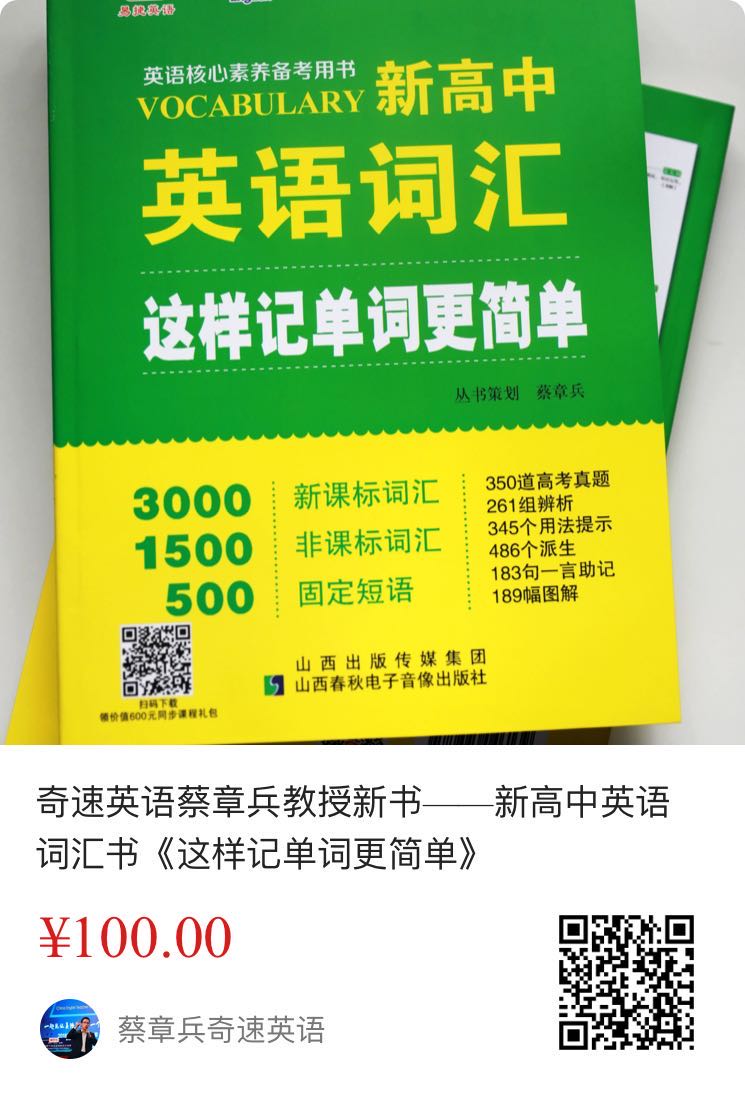
奇速英语将一直致力于改变和引领中国英语词汇和阅读教学。请让孩子参加本次学习,完成全部课程,孩子的词汇量至少提升2000+!除此之外,以上英语冬令营课程也可以在线学习,奇速英语小学在线课程、初中英语同步涨分课程(初一、初二、初三)、高中英语同步涨分课程(高一、高二)在线试听可以点击链接报名http://www.qisuen.cn/wx/user/account/elevenActivityIndex?fromer=21

(英语冬夏令营单词阅读课程扫码联系老师参与课程报名)
想来四川旅游,有娃的家长可以了解一下奇速英语千人冬令营夏令营!全程英语单词阅读涨分的。12月报名最大优惠。旅游学习两不误。
-
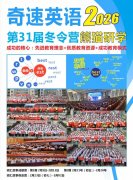
2026寒假高一英语冬令营河南驻马店、济源寒假英语培训班及奇速英语冬令营优势特色
(136)人喜欢 2026-01-20 -
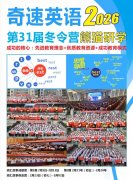
2026寒假高二英语冬令营如何选择,河南信阳、周口寒假英语培训班及奇速英语冬令营优势
(58)人喜欢 2026-01-20 -
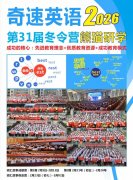
2026福建泉州初二.高二英语寒假冬令营哪个比较好、全国十大英语单词冬令营品牌推荐
(92)人喜欢 2026-01-15 -
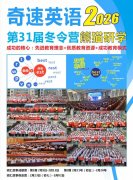
2026福建福州寒假高一冬令营令营哪个比较好、全国十大英语冬令营品牌奇速英语集训班推
(145)人喜欢 2026-01-15 -
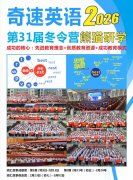
2026广东汕头市、佛山市寒假初一高一冬令营哪个机构好、英语集训营冬令营一次要多少费
(134)人喜欢 2026-01-15 -
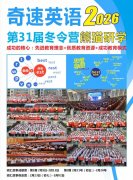
2026河北高一英语寒假冬令营哪家好?邢台、保定、廊坊、承德口碑好的奇速英语冬令营推
(210)人喜欢 2026-01-15 -

高三家长必看!这个寒假,帮孩子的高考英语再冲 20+!奇速英语高考专项冬令营紧急开营
(198)人喜欢 2025-11-26 -

寒假高一英语冬令营河南驻马店、济源寒假英语培训班及奇速英语冬令营优势特色
(90)人喜欢 2025-11-13 -
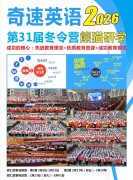
高二英语寒假冬令营如何选择,河南信阳、周口寒假英语培训班及奇速英语冬令营优势特色
(154)人喜欢 2025-11-13 -
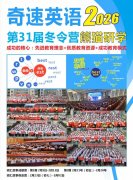
2026寒假高一英语冬令营河南驻马店、济源寒假英语培训班及奇速英语冬令营优势特色
(177)人喜欢 2025-11-05
时文精读与故事记单词,这是我用过的英语成绩提

暖冬筑梦,英启新章——奇速英语冬令营,让每个

暖冬筑梦,英启新章——奇速英语冬令营,让每个

不负暖冬,英你闪耀——奇速英语冬令营,解锁孩

不负暖冬,英你闪耀——奇速英语冬令营,解锁孩

不负暖冬,英你闪耀——奇速英语冬令营,解锁孩

不负暖冬,英你闪耀——奇速英语冬令营,解锁孩

不负暖冬,英你闪耀——奇速英语冬令营,解锁孩

不负暖冬,英你闪耀——奇速英语冬令营,解锁孩

不负暖冬,英你闪耀——奇速英语冬令营,解锁孩

不负暖冬,英你闪耀——奇速英语冬令营,解锁孩

不负暖冬,英你闪耀——奇速英语冬令营,解锁孩

不负暖冬,英你闪耀——奇速英语冬令营,解锁孩

暖冬启智,英领成长 —— 奇速英语冬令营,让孩

暖冬启智,英领成长 —— 奇速英语冬令营,让孩

寒假超车正当时,奇速英语冬令营让孩子与优秀并

冬藏锋芒,英绽新程 —— 奇速英语冬令营,解锁

冬藏锋芒,英绽新程 —— 奇速英语冬令营,解锁

冬藏锋芒,英绽新程 —— 奇速英语冬令营,解锁

寒假燃动英语力,奇速营启新征程 —— 奇速英语
